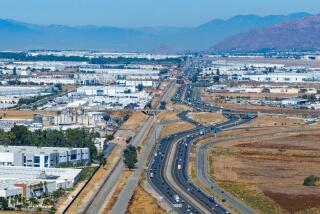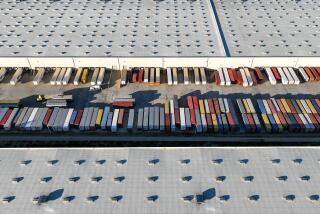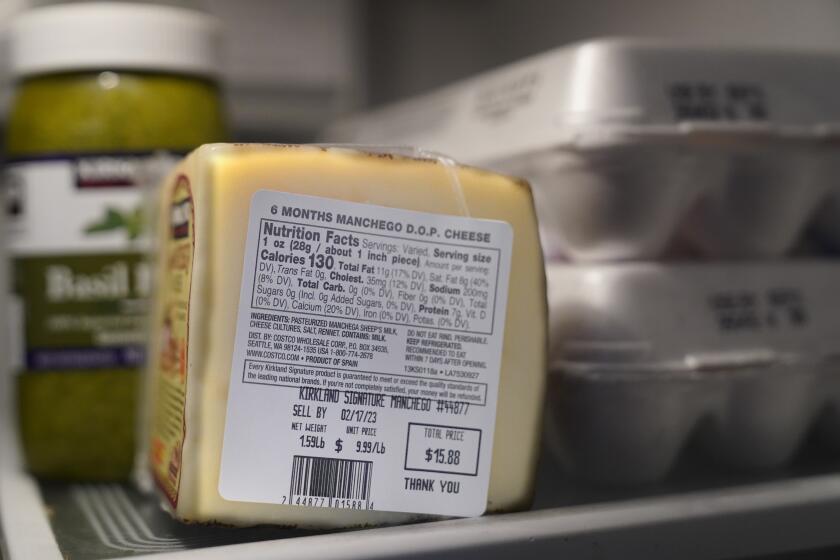Politicians on L.A.’s Eastside vow to kill warehouse planned near grade school

Two Eastside elected officials are pushing for the city of Los Angeles to block the approval of a planned warehouse in Lincoln Heights, saying the facility would be a dangerous source of truck traffic and diesel emissions.
Standing outside City Hall on Tuesday, City Councilmember Eunisses Hernandez and school board member Rocio Rivas warned the 62,000-square-foot facility would pose a serious health threat to students and staff at nearby Hillside Elementary School, located across the street on Pasadena Avenue.
Hernandez said Lincoln Heights, a working-class neighborhood northeast of downtown, is already impacted by “severe environmental injustices,” including polluting freight trains, contaminated industrial sites and the 5 Freeway.
“This would be a slap in the face to that community,” said Hernandez, who represents the area. “You’re going to have [truck] trailers going in and out of there, all the pollution they’re going to be bringing in, all the additional trash.”
Industrial developer Xebec Realty is listed on a city planning form as the company seeking to build the warehouse, which would be located on what is now an empty lot just north of a 468-unit residential complex now under construction. The site is also near the Metro A Line’s Heritage Square station.
Scott DiCesare, a Xebec Realty development manager whose name appears on the form, did not respond to multiple calls and emails from The Times asking about the project. A woman who answered the phone at Xebec’s office said DiCesare had no comment.

For the past year and a half, city inspectors have been reviewing permit applications for electrical work, grading and other construction activities planned as part of the warehouse project.
The developer filed its application to build the structure in June 2023, according to city records. At that time, the project was allowed “by right” under city zoning laws, Hernandez said. That means it did not need approval from the City Planning Commission, which is made up of mayoral appointees, or the City Council.
Since then, Hernandez has erected new obstacles to the project.
In October, she won city council approval of an interim control ordinance that would temporarily prohibit development of any warehouse larger than 15,000 square feet in the area. That moratorium would not be lifted until the city finishes rewriting the Cornfield Arroyo Specific Plan, which spells out what can be developed in parts of Chinatown and Lincoln Heights.
The Lincoln Heights project was not initially covered by the warehouse moratorium, since its permit application was filed more than a year before the measure went into effect. That changed on Monday, Hernandez said, when the application expired due to a lack of completed paperwork.
Gail Gaddi, a spokesperson with the city Department of Building and Safety, confirmed that the project’s permit application expired 18 months after it was filed.
City officials have granted the developer’s request to extend the expiration date, Gaddi said. However, the project will now be subject to the city’s current zoning requirements, including the restrictions spelled out in the interim control ordinance, she said.
The revised Cornfield Arroyo plan is expected to come up for a city council vote this summer. If the plan is approved, the developer of the Lincoln Heights site would be required to obtain a conditional use permit for any warehouse larger than 15,000 square feet, a process that would allow the city to seek measures to address the project’s neighborhood impacts, said planning department spokesperson Nora Frost.
That process would give local residents the opportunity to weigh in — and the City Council the power to reject the project outright, according to Hernandez and her team.
“The community does not want this project,” Hernandez said. “And we’re going to do whatever we can to make sure it doesn’t happen.”

The warehouse would be built on the site of a former dry cleaning business whose operations contaminated the property so extensively that the state’s Department of Toxic Substances Control is charged with monitoring the site.
Rivas, the school board member, said approval of a warehouse on that location would be “a recipe for disaster,” bringing polluting trucks into the neighborhood.
“Many developers claim that they have the right to build. But what about our rights?” she said. “What about the rights of our children and their families? They deserve clean air and to live in a healthy environment.”
Michael Henry Hayden, who lives a block from the warehouse site, said the project’s impacts would go beyond truck emissions. The warehouse’s main driveway is planned next to a crosswalk for Hillside Elementary School, he said.
“These trucks would barrel down residential streets for more than a mile between here and the highway,” Hayden said.
Hayden contends the state’s toxic substance regulators have not overseen a proper cleanup of the warehouse site and the surrounding area. Until that happens, he said, no development should be approved on the property.
Hernandez, for her part, is still hoping to find an alternative to the warehouse. She said that during her first year in office, her staff communicated with the property owner about turning the site into a city park. That strategy would cost millions of dollars and require extensive cleanup of the site.
“The idea of a park was not viable at that time,” she said. “But that doesn’t mean it’s not going to happen.”
More to Read
Sign up for Essential California
The most important California stories and recommendations in your inbox every morning.
You may occasionally receive promotional content from the Los Angeles Times.












